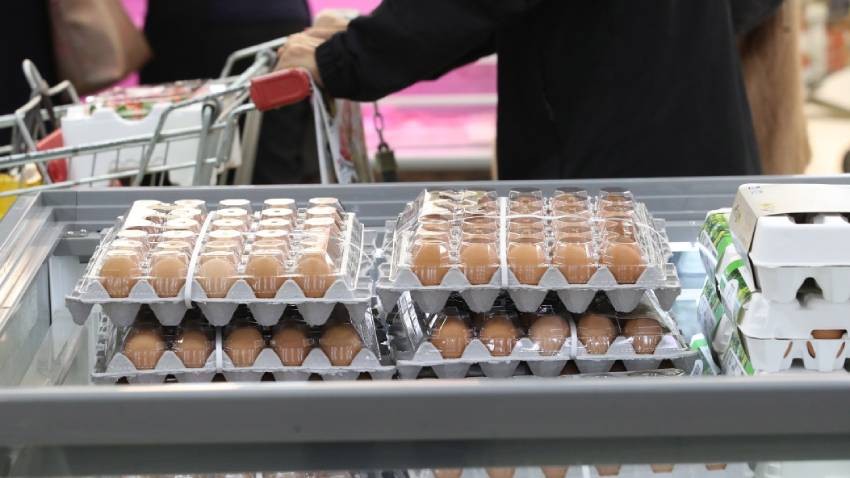According to data of the National Statistical Institute, 30% of retailers in Bulgaria expect that prices in this country will continue to rise in the next three months, even though the prices of essentials such as eggs, vegetables and dairy products have recently reached record heights. 30 percent of the surveyed merchants point out that lower demand is a problem the affects the industry. In construction, the expectations for higher prices are shared by nearly 32% of entrepreneurs, while in all sectors the major problems remain the uncertain economic environment and the lack of workforce in Bulgaria.
The price of one of the most used products in households - eggs, has marked a record rise. For a few months it has risen by more than 70 percent. The egg has become something of a symbol of high inflation and there have even been calls for boycotting the "golden eggs" until Easter in an attempt of citizens to bring prices down. The appeal also applies to other products such as milk and cheese and some propose introduction of a price cap on basic foods.
Can consumers force retailers to lower prices and how does supply and demand affect the price of eggs in stores?

"In recent weeks, we have observed a halt in the rise of prices of eggs and this is most likely caused by public interest and by the reports that analyzed the commercial chains,” Ivaylo Galabov, chairman of the Union of Poultry Breeders in Bulgaria, has told Radio Bulgaria. “After all, everyone in the chain is motivated to sell as much as possible, so this can lead to a decline in prices as we still count on our products to be consumed daily and to be available to Bulgarian users.”
Ivaylo Galabov quotes EUROSTAT data, according to which the producers’ price of eggs in Bulgaria are the lowest in the EU, but the retail price at the end consumer depends on the VAT, which in this country is 20% (In Poland it is 3%, and in Germany – 8%).

"Market price of eggs is mainly determined by market mechanisms, just like all other goods. Supply and demand shape the price. The market price is not interested in the production price of the products. I can point out that in the previous two years the price of all poultry products was much higher than their market value and the price that was paid in the shops," Ivaylo Galabov says. The positive news for Bulgarian producers is that they manage to fully satisfy the domestic market:
"Bulgaria exports about 30% of its production, with the largest share of exports going to Greece as it is a neighboring country and transport costs are low. Our sector has been developing well, despite the crises that followed one after another.”
Consumers in Bulgaria are worried that something is wrong and that someone has been speculating with the prices.
The relations between the store chains and the Bulgarian producers, processors and suppliers is a topic that the Trade Union in the Food Industry at the CITUB is interested in. Its chairman - associate professor Slavcho Petrov expressed doubts in an interview with BNR- "Horizont" that in chain stores a markup of 40 to 60% and more is added to the manufacturer's price and no one explains where this price comes from. As a result, the producers, especially the farmers and the end users are the ones who suffer the consequences. "The chain stores are silent and do not raise the topic," the trade union representative said.

"Let the merchants say what they add to that price - whether it's warehouse costs, labor wages, electricity, etc. and what the markup is. So we can see why the final price is double the initial. Someone is hiding or abusing their monopoly position. But people won’t tolerate this anymore, as they know the production price and make complaints, but the question is if enough attention is paid to them. Politicians, economists and everyone else comment on the issue but the two main bodies - the Commission for the Protection of Competition and the National Revenue Agency are silent on the topic."

At the beginning of today's government meeting, Galab Donev recalled that the rise in the price of food products is a painful issue for a large part of Bulgarians.
In the search for solutions against high food prices, the caretaker cabinet will seek a dialogue with the retail chains. A newly-formed National Coordination Unit will prepare mechanisms for monitoring and controlling food prices in accordance with national and European legislation.
Photos: BGNES, BNR, Freepik.com
The average price of apartments sold in Sofia in the third quarter of 2025 reached €2,310 per square metre , marking an annual increase of 25.5%, according to data from Bulgarian Properties. While new developments remain popular, limited supply and..
Natural gas prices in Bulgaria are set to fall by just over 4% in December , significantly higher than the previously forecast 1% drop, according to calculations by state-owned supplier Bulgargaz, reported BNR correspondent Yuliyana Kornazheva. This..
The Executive Board of the International Monetary Fund (IMF) has concluded the 2025 Article IV Consultation with Bulgaria. According to the IMF’s procedure for assessments and recommendations, domestic demand is driving a robust expansion of the..

+359 2 9336 661
